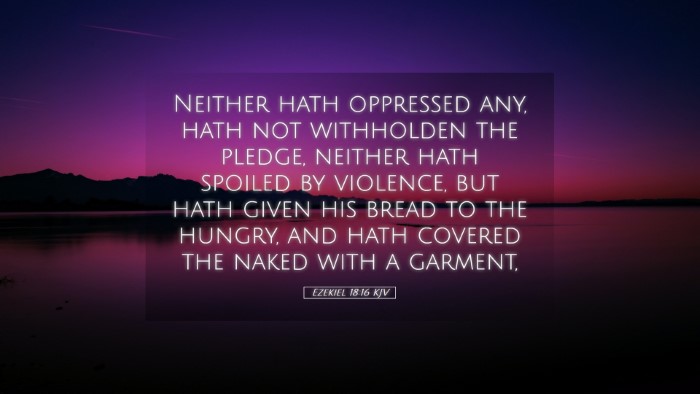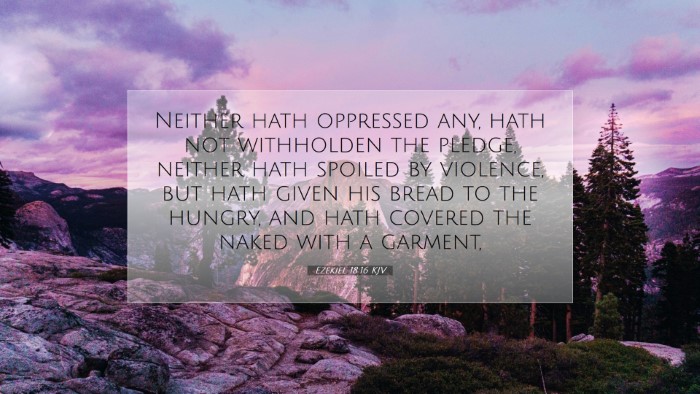Ezekiel 18:16 Commentary
Bible Verse: Ezekiel 18:16 states, "Neither hath oppressed any, hath notwithholden the pledge, neither hath spoiled by violence, but hath given his bread to the hungry, and hath covered the naked with a garment." This verse is vital in understanding individual responsibility and the nature of righteousness in Yahweh's sight.
Contextual Background
In Ezekiel 18, the prophet emphasizes the principle of personal accountability in matters of sin and righteousness. This chapter is a response to popular notions of inherited guilt and a rebuttal against the belief that children suffer for the sins of their parents. The focus is on individual behavior and its consequences, illustrating that each person is judged according to their own actions.
Analysis of the Verse
This verse constitutes part of a broader discourse on the character of a righteous man. Ezekiel outlines several key attributes that define such an individual, particularly highlighting ethical behavior towards others.
- Oppression: The text states, "neither hath oppressed any," indicating a condemnation of exploitative actions. Righteousness involves treating others justly and refraining from coercive or abusive behavior.
- Pledge withholden: The phrase "hath not withheld the pledge" addresses the importance of integrity and faithfulness in one's commitments, particularly in financial dealings or promises made to others.
- Violence: The righteous person does not engage in acts of violence or theft, thus demonstrating deep respect for the life and property of others.
- Charity: The mention of "giving bread to the hungry" underscores the duty of compassion and charity, aligning with the biblical mandate to care for the needy and marginalized in society.
- Covering the Naked: "Hath covered the naked with a garment" represents a moral obligation to provide for those in need, offering not just material support but also dignity and respect to the vulnerable.
Theological Implications
This verse encapsulates significant theological themes regarding human responsibility, ethical living, and God’s expectations of His people. It insists that individuals are accountable for their own actions rather than bearing the consequences of another's sins.
Matthew Henry emphasizes that this verse highlights the active nature of righteousness, which is expressed through deeds rather than mere beliefs or identity. God desires a people who reflect His character through their conduct.
Albert Barnes notes how this righteous behavior is interwoven with social justice. It serves as a model for believers, demonstrating that faith must express itself in love and practical assistance to others, reinforcing the New Testament's call to love one's neighbor.
Adam Clarke elaborates on the societal implications, asserting that true spirituality is demonstrated in how believers engage with the world, emphasizing that one’s witness is tarnished when they fail to act justly and compassionately.
Practical Applications
For pastors and theologians, Ezekiel 18:16 serves as a clarion call to not only preach the gospel but also enable congregations to embody these principles of righteousness in everyday life. The following applications can be derived from this text:
- Encouragement of Personal Accountability: Pastoral teachings should emphasize the importance of personal responsibility in faith and ethics, urging believers to examine their conduct regularly.
- Community Outreach: Churches ought to organize initiatives to feed the hungry and clothe the needy, showcasing the church as a center of compassion and support for the community.
- Integrity in Dealings: Individuals should strive for honesty and integrity in all their interactions, particularly in financial or relational commitments, reinforcing the idea that financial peace is often linked to moral action.
- Advocacy for Social Justice: Sermons should incorporate themes of justice, encouraging congregants to stand against oppression and support systems that uplift the downtrodden.
Conclusion
In summary, Ezekiel 18:16 provides a profound insight into the heart of biblical ethics, calling each believer to a standard of righteousness that reflects the character of God. It challenges the community of faith to move from passive belief to active compassion and justice, grounding their actions in love for others. The implications of this verse resonate across generations, serving as a timeless guide for living out one’s faith in practical, impactful ways.


